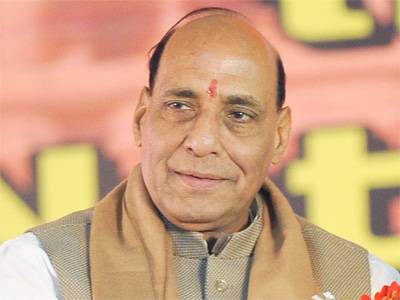
Country Statement made by Rajnath Singh in the 3rd World Conference on Disaster Risk Reduction 14-March, 2015 .
Country Statement made by Rajnath Singh in the 3rd World Conference on Disaster Risk Reduction
Following is the text of the Country Statement made by the Union Home Minister, Shri Rajnath Singh in the 3rd World Conference on Disaster Risk Reduction, in Sendai, Japan on March 14, 2015:
“It gives me immense pleasure to be a part of the Indian delegation for the Third World Conference on Disaster Risk Reduction. On behalf of the Government and the people of India, I wish to congratulate the United Nations and the host, the Government of Japan, for organizing this event.
The Hyogo Framework for Action has provided a blue print for disaster risk reduction activities including promotion of culture of prevention, mitigation, preparedness and resilience at all levels. Since then, considerable progress has been made by investing resources and enhancing capacities in dealing with the disasters. However, much needs to be done in the future.
Recent events in India such as the landslides and floods of 2013 in the Himalayan State of Uttarakhand, cyclone ‘Phailin’ in Odisha in 2013, the floods and landslides in Jammu & Kashmir and cyclone ‘Hudhud’ in Andhra Pradesh in 2014 have once again brought into focus the need for multiplying our efforts towards disaster risk reduction. The unplanned development of cities and lack of proper infrastructure are the major challenges of the future. While communities, particularly women and children, exposed to these events are trying to adapt to these regular occurrences, the economic and social costs continue to mount year after year.
In India, our ancestors gave us the concept of ‘Vasudhaiva Kutumbakam’, which means that the whole planet — with all its human beings, plants, animal, birds and natural resources — is one family. This ancient realisation of our inter-connectedness is even more relevant and urgent today. I would like to call upon this august gathering to embrace this notion and enhance international cooperation through sharing of technology, expertise and necessary resources. Here I would also like to reiterate the commitment made by our Prime Minister in SAARC Summit last year by ensuring India’s help and expertise to the neighbouring countries.
India hosts the SAARC Disaster Management Centre which is working towards putting in place a framework to reduce disaster risks and promoting knowledge sharing among the SAARC countries. The Indian National Centre for Ocean Information Services operates the Tsunami Early Warning System. This is a State-of-the-Art warning system which benefits not only India but also the littoral countries of Indian Ocean. Our National Disaster Response Force which has the expertise in addressing national disasters also attends to disasters in the region and beyond. The National Institute of Disaster Management organizes trainings on various thematic domains of disaster risk management. We are keen to share our expertise and help other countries in disaster response and capacity building. We envisage a bigger role in capacity building in the Asia Pacific region and look forward to build sustained regional and international partnerships under the post-2015 Framework. Apart from the role of specialised agencies, I would also like to note the importance of indigenous technical knowledge and community based methodologies to deal with natural disasters.
I would like to share that the Government of India has mainstreamed disaster risk reduction in its development policies at all levels. By taking adequate measures for preparedness to handle disasters at all the levels, we were able to limit the loss of human lives to 44 in the State of Odisha due to Cyclone Phailin. This is in contrast with the death of over 8900 persons in the Super Cyclone that struck the State in 1999. This substantive reduction could be brought around through regular investments in improving our forecasting systems, apart from capacity building measures involving the communities. More number of multi-purpose cyclone shelters were constructed during this period. More than a million people were evacuated and brought to safe places, before the cyclone Phailin made the land fall.
Our Finance Commission, a constitutional body that recommends distribution of tax proceeds between the federal government and the states, in its recent report has called for hazard, risk and vulnerability assessment in all our states. This will be an important step in ensuring that over time, notions of risk reduction are embedded in every penny we spend on development. We are promoting cooperative federalism and devolving more power and resources closer to the ground of action.
Before concluding, we pledge our support to the post-2015 Framework, its goals and priorities. We commit ourselves to work with countries in the region and beyond in building resilient nations and communities, against disasters. We would also like to call upon all entities, public and private, to strengthen the international support mechanisms for disaster risk reduction by sharing of reliable and affordable modern technology for capacity-building and enabling institutional and policy environment at all levels.”